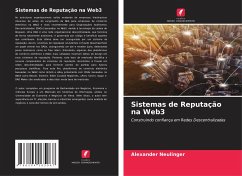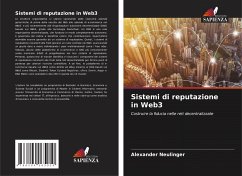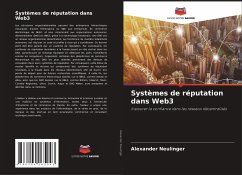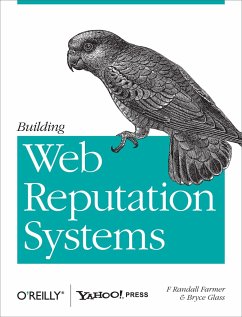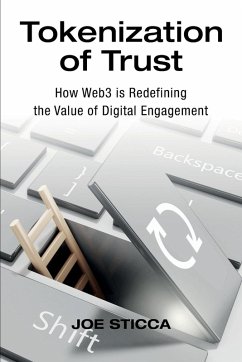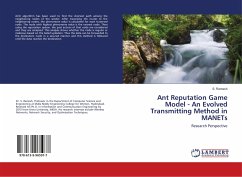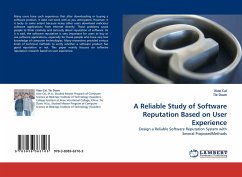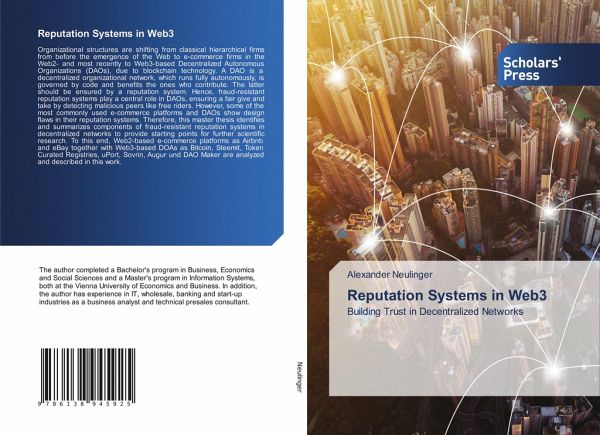
Reputation Systems in Web3
Building Trust in Decentralized Networks
Versandkostenfrei!
Versandfertig in 6-10 Tagen
40,99 €
inkl. MwSt.

PAYBACK Punkte
20 °P sammeln!
Organizational structures are shifting from classical hierarchical firms from before the emergence of the Web to e-commerce firms in the Web2- and most recently to Web3-based Decentralized Autonomous Organizations (DAOs), due to blockchain technology. A DAO is a decentralized organizational network, which runs fully autonomously, is governed by code and benefits the ones who contribute. The latter should be ensured by a reputation system. Hence, fraud-resistant reputation systems play a central role in DAOs, ensuring a fair give and take by detecting malicious peers like free riders. However, ...
Organizational structures are shifting from classical hierarchical firms from before the emergence of the Web to e-commerce firms in the Web2- and most recently to Web3-based Decentralized Autonomous Organizations (DAOs), due to blockchain technology. A DAO is a decentralized organizational network, which runs fully autonomously, is governed by code and benefits the ones who contribute. The latter should be ensured by a reputation system. Hence, fraud-resistant reputation systems play a central role in DAOs, ensuring a fair give and take by detecting malicious peers like free riders. However, some of the most commonly used e-commerce platforms and DAOs show design flaws in their reputation systems. Therefore, this master thesis identifies and summarizes components of fraud-resistant reputation systems in decentralized networks to provide starting points for further scientific research. To this end, Web2-based e-commerce platforms as Airbnb and eBay together with Web3-based DOAs as Bitcoin, Steemit, Token Curated Registries, uPort, Sovrin, Augur und DAO Maker are analyzed and described in this work.
Organizational structures are shifting from classical hierarchical firms from before the emergence of the Web to e-commerce firms in the Web2- and most recently to Web3-based Decentralized Autonomous Organizations (DAOs), due to blockchain technology. A DAO is a decentralized organizational network, which runs fully autonomously, is governed by code and benefits the ones who contribute. The latter should be ensured by a reputation system. Hence, fraud-resistant reputation systems play a central role in DAOs, ensuring a fair give and take by detecting malicious peers like free riders. However, some of the most commonly used e-commerce platforms and DAOs show design flaws in their reputation systems. Therefore, this master thesis identifies and summarizes components of fraud-resistant reputation systems in decentralized networks to provide starting pointsfor further scientific research. To this end, Web2-based e-commerce platforms as Airbnb and eBay together with Web3-based DOAs as Bitcoin, Steemit, Token Curated Registries, uPort, Sovrin, Augur und DAO Maker are analyzed and described in this work.
Organizational structures are shifting from classical hierarchical firms from before the emergence of the Web to e-commerce firms in the Web2- and most recently to Web3-based Decentralized Autonomous Organizations (DAOs), due to blockchain technology. A DAO is a decentralized organizational network, which runs fully autonomously, is governed by code and benefits the ones who contribute. The latter should be ensured by a reputation system. Hence, fraud-resistant reputation systems play a central role in DAOs, ensuring a fair give and take by detecting malicious peers like free riders. However, some of the most commonly used e-commerce platforms and DAOs show design flaws in their reputation systems. Therefore, this master thesis identifies and summarizes components of fraud-resistant reputation systems in decentralized networks to provide starting pointsfor further scientific research. To this end, Web2-based e-commerce platforms as Airbnb and eBay together with Web3-based DOAs as Bitcoin, Steemit, Token Curated Registries, uPort, Sovrin, Augur und DAO Maker are analyzed and described in this work.





